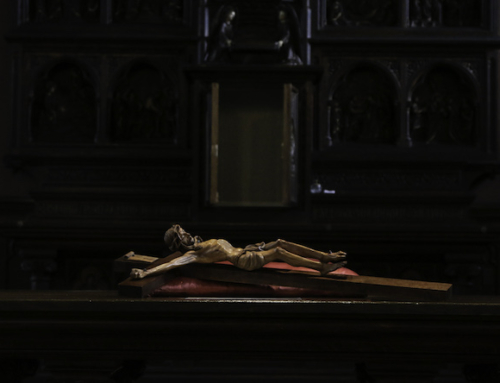Yesterday we entered once again into the holy season of Lent, received our ashes, and were reminded that “you are dust, and to dust you shall return” or more explicitly, were exhorted to “repent, and believe in the Gospel.”
Despite fluctuations in various Catholic practices between generations, Lent has remained very popular. We probably noticed that the number of people present to receive their ashes at yesterday’s Mass was significantly higher than the number of people during most regular weekdays and perhaps even some Sundays.
Some people have explained this increased participation by noting that people are more likely to come to Mass when they “get something,” like ashes on Ash Wednesday or palms on Palm Sunday. Sadly these rituals can draw more of a crowd than the opportunities we’re given every Sunday, like hearing the Word of God read and preached to us or receiving Jesus Christ in the Eucharist—body, blood, soul, and divinity. This explanation, however, is challenged by one of the largest US Catholic surveys, which found that even more people are willing to give something up—meat on every Friday during the season of Lent.
The traditional Friday abstinence from meat during Lent remains by far the most popular Lenten practice, and perhaps the most popular Catholic practice during the whole year. Among all generations, this has remained constant despite how consistently (or not) people practice their Catholic faith. So what is it that makes the Friday abstinence from meat so popular? Is the Friday Fish Fry really that enticing? While I myself do love a good fish fry, I think there must be a deeper attraction.
Many of us tend to overindulge in calories in our eating, luxury in our spending, curiosity in our web surfing, and laziness in our work, family or religious responsibilities throughout the year. Despite our best efforts to change or to uphold our New Year’s resolutions, we find ourselves slipping into those old habits again. But something tells us that we were made for more, and we recognize that to change we need some sort of sacrifice.
Perhaps being reminded of our mortality on Ash Wednesday is what puts us in touch with this desire to transcend our short number of days here on earth. Maybe the knowledge that we will soon come face to face with Christ’s Passion on Good Friday helps to remind us of our usual ingratitude for so many things, stirring in us the desire to be grateful in at least some small way during these 40 days.
Though we may understand that only sacrifice can lead to change, are going to Fish Fridays enough? What is the real purpose of these sacrifices of ours?
For thou hast no delight in sacrifice; were I to give a burnt offering, thou wouldst not be pleased. The sacrifice acceptable to God is a broken spirit; a broken and contrite heart, O God, thou wilt not despise (Ps 51:16-17).
Any sacrifice, any penance that we undertake this Lent only has value as part of a deeper repentance. As Pope Francis exhorted us in his Lenten message, we need conversion of the heart. God takes no delight in us simply changing our diet. He wants more from us and desires to give us more than Fish Fridays. He wants our whole heart, so that he can give himself to us that we may enjoy him forever in eternity.
Perhaps we are still stuck in some habitual sins, or have already found new ones this year. We may find ourselves weary, doubting, and skeptical of our ability for conversion. “Indeed, for man this impossible,” but fortunately for us “with God all things are possible” (Mt 19:26).
While it surely is good news that all things are possible with God, why do I still need to sacrifice? Why can’t God just perform a “mystical heart transplant” to achieve this conversion?
As St. Augustine, a converted sinner and proclaimer of God’s grace, reminds us,
God created us without us, but he did not will to save us without us.
Jesus Christ, by his supreme sacrifice, has already won for us the grace for conversion. As he continues to work in our lives, he invites us to cooperate with this grace. May we respond to his invitation to conversion of heart this Lent, through our sacrifices of prayer, fasting, and almsgiving. Then may our hearts be transformed to love as he loves, drawing us ever closer to him, the source of everlasting joy.
✠
Image: Kristi Decourcy, Red Snapper







